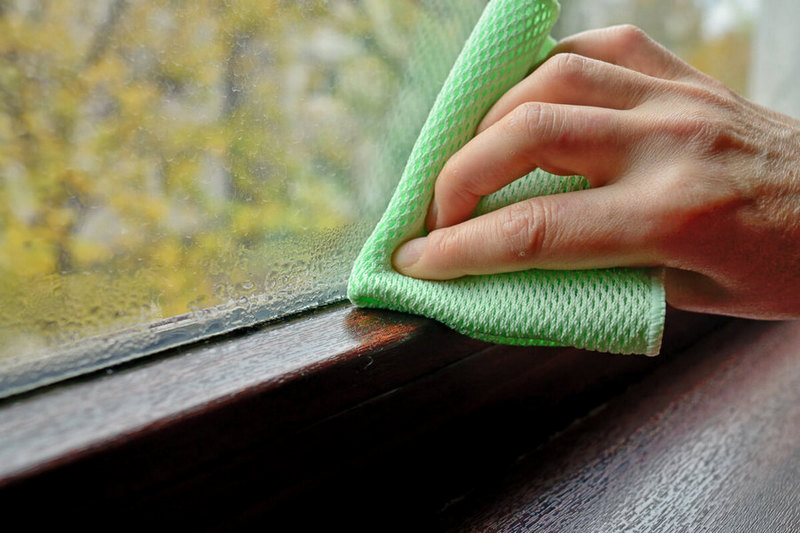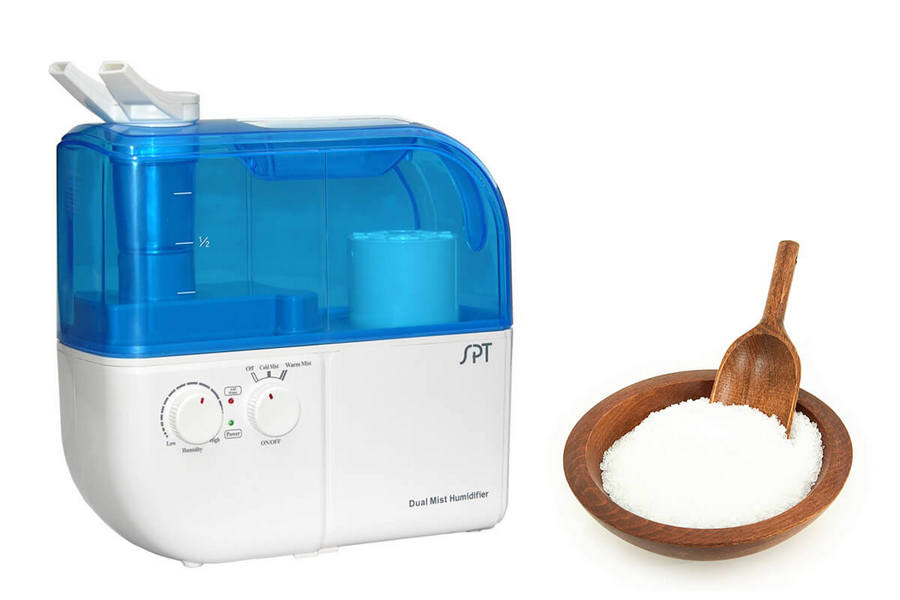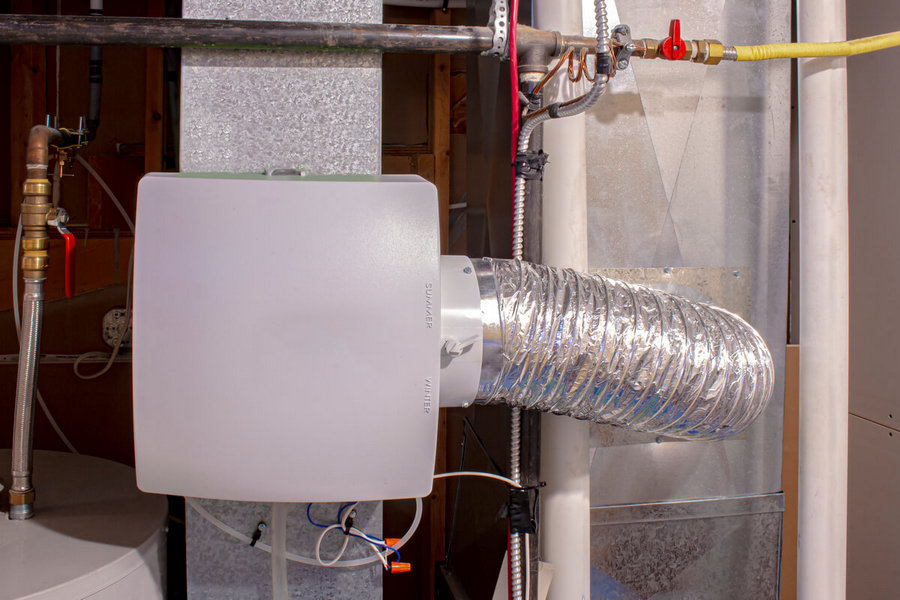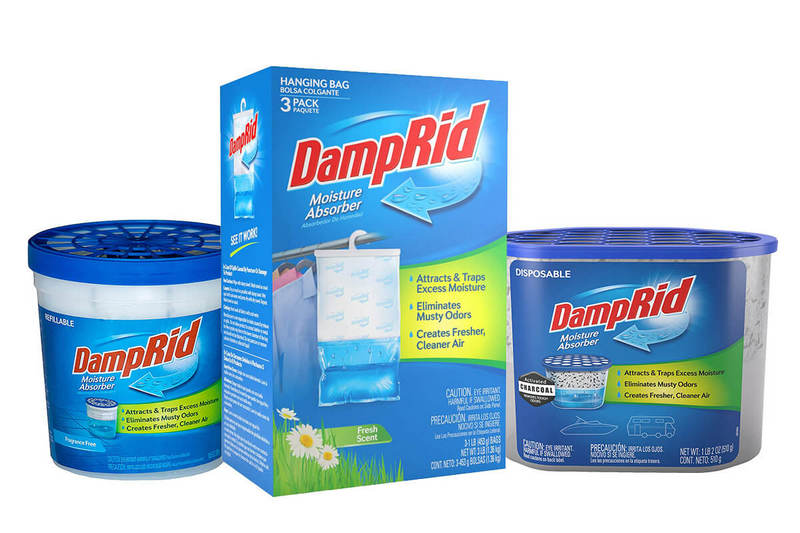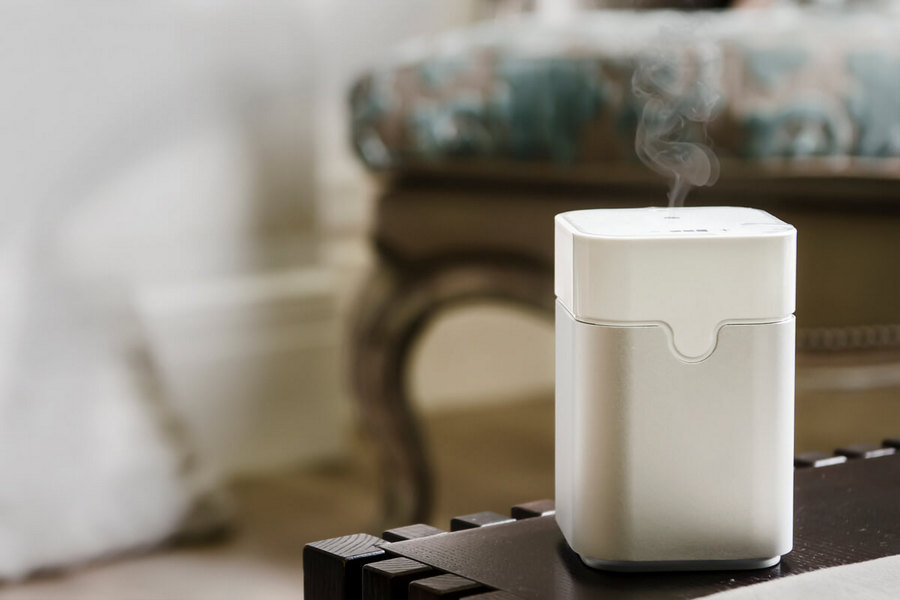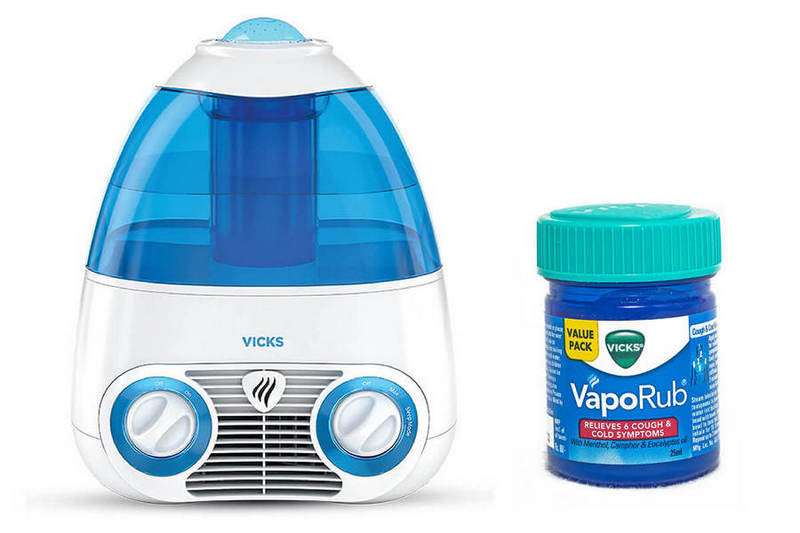Dealing with high humidity in a house is not easy – it can be very uncomfortable and stressful. You’re constantly feeling hot, and you’re sweating profusely. Your entire body is sticky, and your heart is beating way too fast.
In the worst scenario case, too much moisture can be suffocating and introduce troubles with breathing. It’s important to maintain ideal humidity levels indoors to avoid complications with your health, prevent irritability, and stay comfortable.
Symptoms of High Humidity in Your Home
You’re obviously not gonna be walking around with a hygrometer, so how can you tell if it’s too humid?
One of the most obvious symptoms of high humidity inside your house is persistent sweating. Constantly feeling sticky can make you very irritable. Sweat can’t evaporate because of the high moisture content in a humid room, so you gain no relief.
Another evident indicator of excess humidity indoors is being unable to sleep well at night. The National Sleep Foundation talks about how humidity impacts sleep. They state that air that is too dry or too moist can disrupt sleeping patterns negatively.
A more serious and concerning sign of a humidity problem in your home is experiencing trouble with breathing. This has the potential to lead to symptoms of asthma. Humid air triggers certain nerves in the lungs that constrict your airways. It also turns the air inert, which traps allergens. This can cause serious respiratory issues.
Furthermore, if you are experiencing any of the following symptoms, it may be due to high humidity levels in your home:
- Mold growth
- Condensation on windows
- Peeling paint
- Rust on metal objects
- Dampness in carpets or furniture
You May Also Like: Why Is There So Much Dust In My Room
Is Too Much Humidity Hurting Your Health?
The renowned Greek physician, Hippocrates, once said, “everything in excess is opposed to nature.” This can be applied to humidity. High indoor humidity levels can cause several health problems.
But how much humidity is too much?
The amount of humidity that is too much depends on the climate and environment in which you are living. In general, a humidity level between 30-70% is comfortable for most people. If the humidity level is higher than 70%, it can start to cause problems such as respiratory issues, skin irritation, and mold growth.
You’re dependent on the air to get rid of sweat on your body, so when you can’t – you’re prone to dehydration and even heat strokes. In a study, it was found that respiratory infections were less common in people who spent time in an environment with moderate humidity, as opposed to high/low levels.
It can have both direct and indirect effects on your health. High moisture content in the air is a paradise for bacteria and viruses. If you have allergies then excessive humidity is deadly.
Read Also: What Temperature Kills Germs
What if you’re an asthmatic? It gets even worse because dust particles thrive in these conditions. Since bacteria thrive in such settings, so does mold. Mold can be an irritant to your eyes, nose, and even lungs.
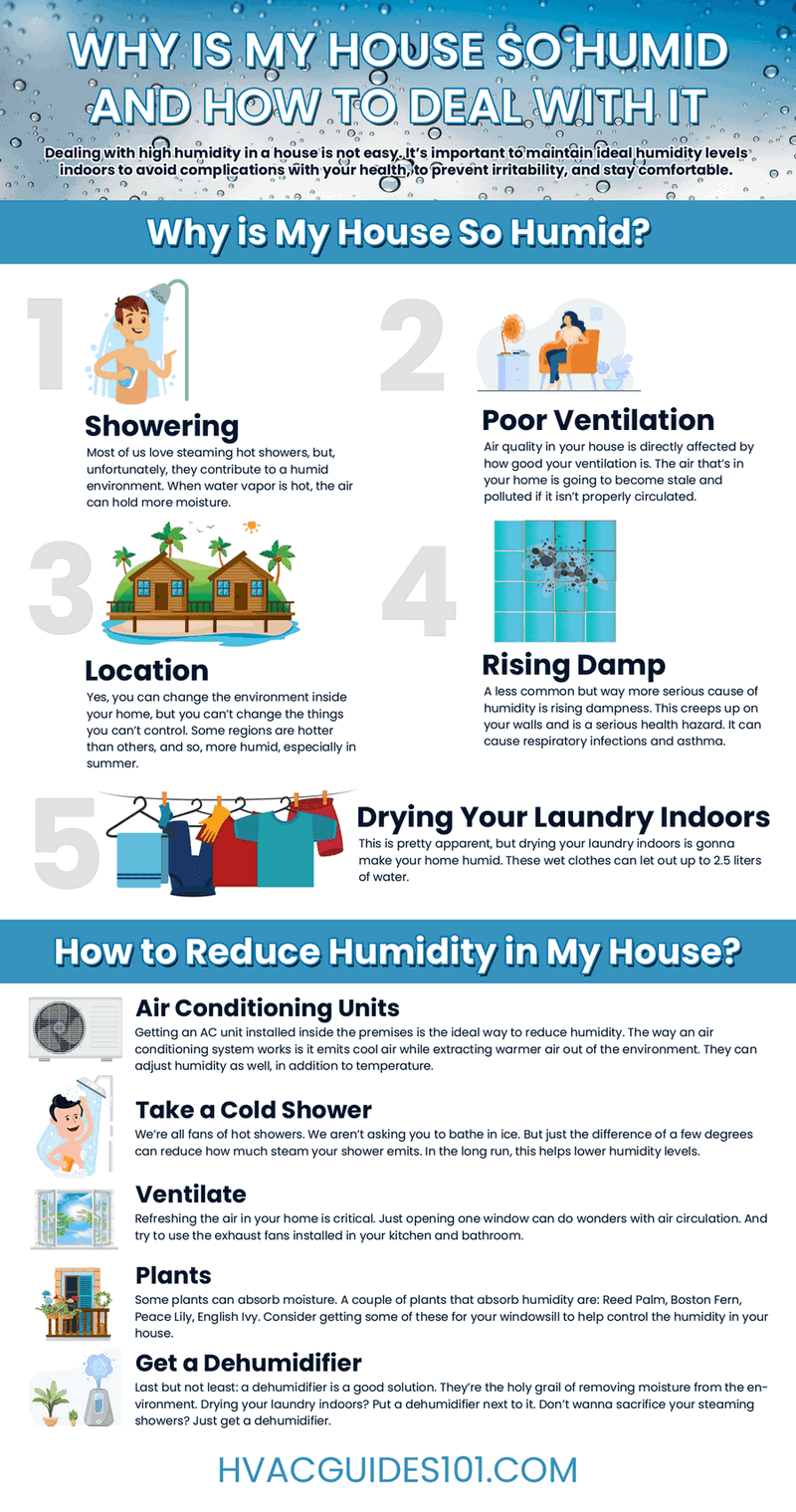
What Causes High Humidity in a House?
It’s time to finally break it down. What exactly is causing these high humidity levels in your home? Let’s go through the four primary causes of excess humidity and discuss these factors.
Showering
Most of us love steaming hot showers, but, unfortunately, they contribute to a humid environment. When water vapor is hot, the air can hold more moisture. It can also cause a mold problem, which could spread.
As previously mentioned, mold is a big no-no and causes serious health problems. You should try to turn down the heat. Reduce steam emissions by taking cold showers, which are also good for your skin and hair.
Poor Ventilation
This one is pretty self-explanatory. Air quality in your house is directly affected by how good your ventilation is. The air that’s in your home is going to become stale and polluted if it isn’t properly circulated.
Humidity levels keep on rising when your ventilation system isn’t doing its job. For example, assume you keep on taking those hot showers we just talked about. The humidity they generate isn’t being ventilated.
Try to make sure there’s good ventilation in your home. This will keep the air fresh and will prevent the build-up of moisture.
Location
Yes, you can change the environment inside your home, but you can’t change the things you can’t control. Some regions are hotter than others, and so, more humid, especially in summer.
Warmer air contains more moisture, so places with a coastal climate have higher relative humidity. This also applies to places that get a lot of rainfall. Unfortunately, there are not many remedies for this, besides focusing on your indoor environment.
Rising Damp
A less common but way more serious cause of humidity is rising dampness. This creeps up on your walls and is a serious health hazard. It can cause respiratory infections, asthma, and – you guessed it – mold.
Health issues aside, rising damp can also damage the structure of your home too. It’s important to contact professionals to fix this problem.
Drying Your Laundry Indoors
This is pretty apparent, but drying your laundry indoors is gonna make your home humid. These wet clothes can let out up to 2.5 liters of water.
This volume of water won’t just disappear and you’ll see it come through when the house suddenly feels stuffier. Invest in a clothesline and dry your laundry outside.
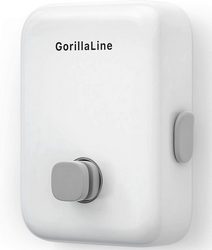
Check out this retractable clothesline on Amazon.
Causes of High Humidity with Air Conditioning Units
Read along to learn about the main reasons for high humidity with the air conditioning unit running inside the room.
Single Speed
This problem usually occurs with air conditioners that run at one speed only.
For instance, the unit turns on and continuously runs till it reaches the desired temperature and later, the unit again turns off till the temperature rises above a specific thermostat threshold. In such a case, the AC unit doesn’t run continuously to remove the humidity from the room.
You can address the issue by installing an HVAC system that offers variable speed options.
Oversized AC system
Installing an oversized AC leads to frequent turning on and off the powerful compressor. Hence, again, the unit doesn’t run properly for a longer time to control humidity in your home. That’s why it’s best to install the HVAC system according to the size of the room.
Frost on Evaporator Coils
Having muggy air despite using a properly sized AC with variable speed leads to one thing – frozen evaporator coils.
The frost on the evaporator coils of the AC unit doesn’t allow the AC system to function properly.
Similarly, you should also clean the air filter and AC unit periodically to remove the dirt, debris, and dust that severely affect the refrigerant cycle.
How to Decrease Moisture and Humidity in the Home?
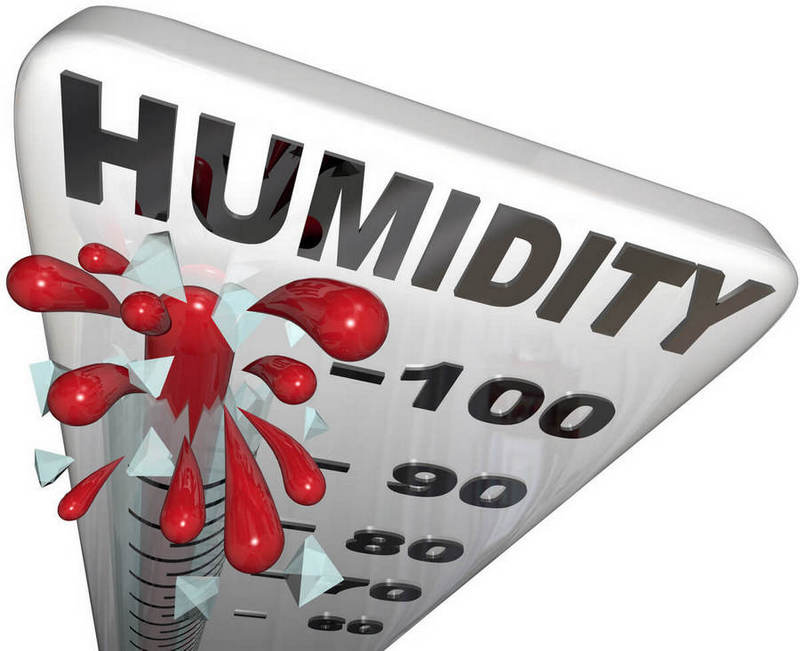
According to the American Society of Heating, Refrigerating and Air-Conditioning Engineers, the humidity level in your home shouldn’t exceed 65 percent. An ideal range goes from about 30-50%. In winter, this standard is lowered to 30-40%.
So, the question arises – what steps should you take to reduce humidity in your home?
Air Conditioning Units
Getting an AC unit installed inside the premises is the ideal way to reduce humidity. The way an air conditioning system works is it emits cool air while extracting warmer air out of the environment. They can adjust humidity as well, in addition to temperature.
Take a Cold Shower
As mentioned before, we’re all fans of hot showers. We aren’t asking you to bathe in ice. But just the difference of a few degrees can reduce how much steam your shower emits. In the long run, this helps lower humidity levels.
Ventilate
Refreshing the air in your home is critical. Just opening one window can do wonders with air circulation. So just do it. Open that window. It’s not gonna hurt anyone.
And try to use the exhaust fans installed in your kitchen and bathroom. They’re there for a reason, so let them do their job.
Plants
This one is a little paradoxical. On the one hand, house plants can boost humidity levels. On the other, some plants absorb moisture.
The water you give plants eventually evaporates into the air hence humidity levels see a rise. But, some plants can actually absorb moisture. This can help reduce humidity.
A couple of plants that absorb humidity are: Reed Palm, Boston Fern, Peace Lily, English Ivy.
Consider getting some of these for your windowsill to help control the humidity in your house.
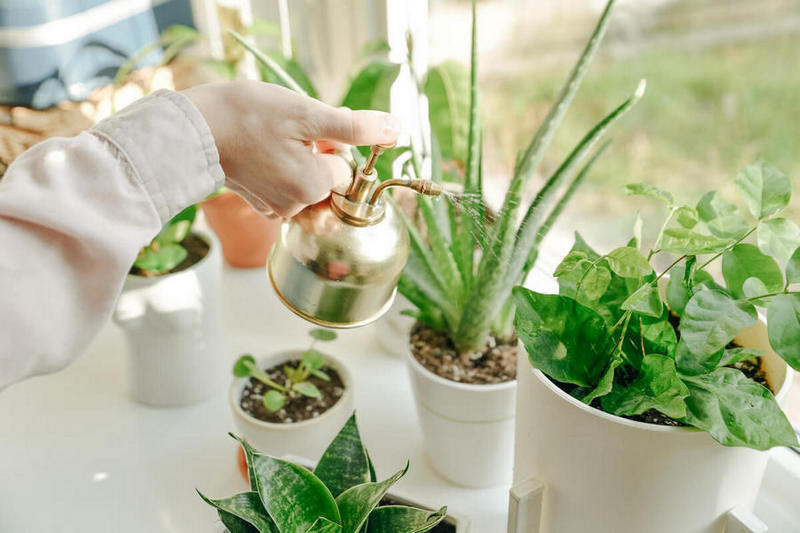
Read Also: Best Temperature for Indoor Plants
Get a Dehumidifier
Last but not least: a dehumidifier is a good solution. They’re the holy grail of removing moisture from the environment.
Drying your laundry indoors? Put a dehumidifier next to it. Don’t wanna sacrifice your steaming showers? Just get a dehumidifier.
Live in a really humid region? Anything that’s causing humidity? You should try a dehumidifier.
The way a dehumidifier works is that it draws hot air into itself using a fan. Dehumidifiers contain refrigerated coils inside them so once the warm air hits them, it condenses. These water drops are fed into a storage tanker attached to the machine.
Cool and dry air is then emitted into your home. Some dehumidifiers also come with humidity meters. And you can actually choose the percentage of humidity you desire in the environment! Oh, and, don’t wanna pay insane cooling bills for your air conditioner? Invest in a ducted whole-house dehumidifier.
Final Verdict
So, in conclusion, high humidity levels should be a concern. It can have a lot of consequences for your health and your home. Excessive humidity is a killer to those with allergies or asthma. It promotes respiratory illnesses.
You should consider one of the above-mentioned methods of reducing humidity if you’re struggling with this issue yourself.

